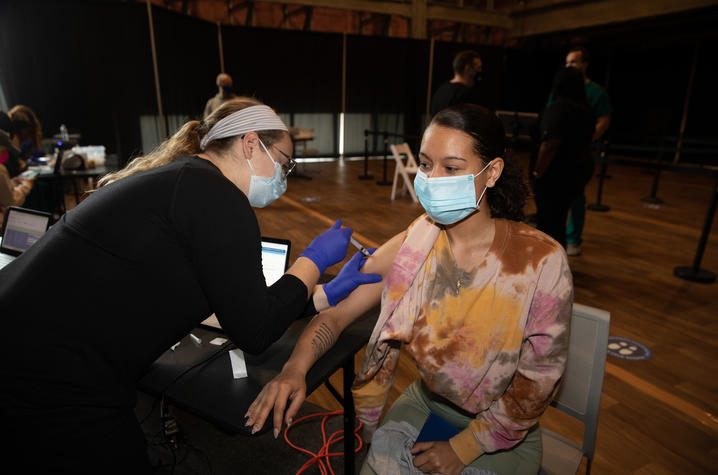LEXINGTON, Ky. (Jan. 20, 2022) — As the University of Kentucky begins another semester during the COVID-19 pandemic, experts from across campus are being called upon to answer the many questions being asked by those on campus and in our communities.
Late last week, University of Kentucky Executive Communication intern Jack Cofer from the Office of Public Relations and Strategic Communications sat down with Rebecca Dutch, Ph.D., and Vince Venditto, Ph.D., two experts who are extremely well-equipped to answer some questions about the health and safety of our community. They provided the most up-to-date information regarding COVID-19, vaccines and booster shots to address concerns within the campus community.
Dutch, vice dean of research for the UK College of Medicine, is a virologist studying the diverse nature of viruses and a professor of molecular and cellular biochemistry.
Venditto is an assistant professor in the UK College of Pharmacy with expertise in cardiovascular diseases, immunology, pharmaceutics and liposomal and vaccine delivery, including COVID-19 vaccines.
Below are some of the highlights from the discussion. Click on the video player above to watch the full conversation.
Why should students and parents receive the COVID-19 booster?
Dutch: When we first started talking boosters back in August, I looked at the data, and I was not sure if we need to be boosted.
However, I was boosted in early December, and there were two main reasons that I received it. I was not worried about hospitalization or death. I had the Moderna vaccine, and the data suggests that the first two shots were sufficient to keep me very well protected.
One reason was that, over time, your chance of getting infected and spreading it seemed to increase, which was surprising you were protected at all. Most vaccines don't do that in terms of any infection.
Vaccines protect you from getting really sick. Because we are trying to reduce spread in the community, I received the booster. For instance, at Christmas, I was going to be spending time with my parents, who are in their late 80s. I wanted to do whatever I could to minimize the risk that I would be infected. My concern was that I didn't want to spread it to those more vulnerable. Those were really the biggest reasons, and the same reason that I encouraged my family and my children to go ahead and get the booster.
In fact, they all expressed the same thing. Before they spent time with their grandparents, they all made sure they were boosted. They were all especially careful because we still want to protect people as much as we can.
How safe is the vaccine and booster for young adults and their parents?
Venditto: It's safe. As I said, they've given so many doses now — 250 million. We really haven't seen any major adverse events or side effects that we wouldn't expect, that we did not see in clinical trials.
So, by all accounts, they are safe and effective. There are some things that we brought up, like heart complications, allergies, etc., that are important to be aware of, but they happen so rarely that most people who get the vaccine are not really going to have any of those side effects. I can say that they are safe and effective, and I would certainly have any of my children, any of my nieces, nephews, or anybody in my family vaccinated and boosted. I recommend that they all get them.
That's what I've done.
What would you say to someone who is hesitant to get the COVID-19 vaccine?
Dutch: I think the first thing to do is to get vaccinated. The thing to do is to be careful about who you listen to and why. I think it's very telling that if you ask infectious disease experts, vaccination experts, doctors, those who work in the hospital wards and in pulmonary who were intubating people, they all are saying the same thing. Not only are they all vaccinated, but they have been pushing their families from the beginning to receive the vaccine.
My brother was asked, “Why should his advice be trusted for vaccination?” And my brother said, “Because the very first thing I told my 89-year-old father was the second you can get that vaccine, you get it.”
If we trust it in our families, if we trust it in ourselves, it's because we trust the vaccine.
Venditto: There's a lot of reasons why people don't get vaccinated and why they're concerned. I would love to respond to every single question about each concern. But I, as one person, can't respond to everybody. The questions asked today are excellent, but they're not always necessarily addressing one person's individual concern, right?
But there are physicians ... There are health care centers all over the Commonwealth and all over the United States in the world right now ... There are pharmacies in every county in the Commonwealth of Kentucky.
So, if you have concerns, go to your pharmacist, go to your physicians, and talk to them about your specific concerns. Let them answer your questions. They are very well-informed about the importance of the vaccines, what they are doing and how they are keeping people out of the hospital.
I think it's important to reach out to those people that you trust and who have the medical information to be able to inform you for your decision.
For more information about UK’s COVID-19 response, visit: http://go.uky.edu/resources. To register for a COVID-19 vaccine, visit ukvaccine.org.
